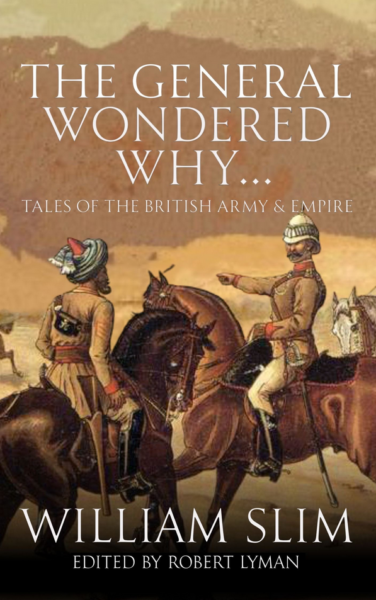It’s no secret that I have a very high regard for Field Marshal William Slim, so I’m quite looking forward to reading some of Slim’s pre-WW2 writings that have just been gathered together by Dr. Robert Lyman in a three-volume set:
Few people during his lifetime, and even fewer now, know that the man who was to become one of the greatest British generals of all time – and I’m not exaggerating – was in fact a secret scribbler. Now, many people know that he was the author of at least two best selling books. In 1956 he wrote his account of the Burma campaign, Defeat into Victory, described by one reviewer, quite rightly in my view, as “the best general’s book of World War II”. Then, in 1959, he published, under the title of Unofficial History, a series of articles about his military experience, some of which had been published previously as articles in Blackwood’s magazine. This was the first indication that there was an unknown literary side to Slim. The fact that he was a secret scribbler, or at least had been one once, was only publicly revealed on the publication of his biography in 1976 by Ronald Lewin – Slim, The Standard Bearer – which incidentally won the W.H. Smith Literary Award that same year. Lewin explained that Slim had written material for publication long before the war. In fact, between 1931 and 1940 he wrote a total of 44 articles, extending in length between two and eight thousand words – a total of 122,000 words in all – for a range of newspapers and magazines, including Blackwood’s Magazine, the Daily Mail, the Evening Express and the Illustrated Weekly of India. According to Lewin, he did this to supplement his earnings as an officer of the Indian Army. He didn’t do it to create a name for himself as a writer, or because he had pretensions to the artistic life, but because he needed the money. As with all other officers at the time who did not have the benefit of what was described euphemistically as “private means” he struggled to live off his army salary, especially to pay school fees for his children, John (born 1927) and Una (born 1930). Accordingly, he turned his hand to writing articles under a pseudonym, mainly of Anthony Mills (Mills being Slim spelt backwards) and, in one instance, that of Judy O’Grady.
With the war over, and senior military rank attained, he never again penned stories of this kind for publication. With it died any common remembrance of his pre-war literary activities. Copies of the articles have languished ever since amidst his papers in the Churchill Archives Centre at the University of Cambridge, from where I rescued them last year. They have been republished this week by Richard Foreman of Sharpe Books.
During the time Slim was writing these the pseudonym protected him from the gaze of those in the military who might believe that serious soldiers didn’t write fiction, and certainly not for public consumption via the newspapers. He certainly went to some lengths to ensure that his military friends and colleagues did not know of this unusual extra-curricular activity. In a letter to Mr S. Jepson, editor of the Illustrated Times of India on 26 July 1939 (he was then Commanding Officer of 2/7 Gurkha Rifles in Shillong, Assam) he warned that he needed to use an additional pseudonym to the one he normally used, because that – Anthony Mills – would then be immediately “known to several people and I do not wish them to identify me also as the writer of certain articles in Blackwood’s and Home newspapers. I am supposed to be a serious soldier and I’m afraid Anthony Mills isn’t.”
What do these 44 articles tell us of Slim? He would never have pretended that his writings represented any higher form of literary art. He certainly had no pretensions to a life as a writer. He was, first and foremost, a soldier. His writing was to supplement the family’s income. But, as readers will attest, he was very good at it. They demonstrate his supreme ability with words. As Defeat into Victory was to demonstrate, he was a master of the telling phrase every bit as much as he was a master of the battlefield. He made words work. They were used simply, sparingly, directly. Nothing was wasted; all achieved their purpose.
The articles also show Slim’s propensity for storytelling. Each story has a purpose. Some were simply to provide a picture of some of the characters in his Gurkha battalion, some to tell the story of a battle or of an incident while on military operations. Some are funny, some not. Some are of an entirely different kind, and have no military context whatsoever. These are often short adventure stories, while some can best be described as morality tales. A couple of them warned his readers not to jump to conclusions about a person’s character. Some showed a romantic tendency to his nature.
The stories can be placed into three broad categories. The first comprises seventeen stories about the Indian Army, of which the Gurkha regiments formed an important part. The second group are eleven stories about India, with no or only a passing military reference. The third, much smaller group, contains seventeen stories with no Indian or military dimension.




